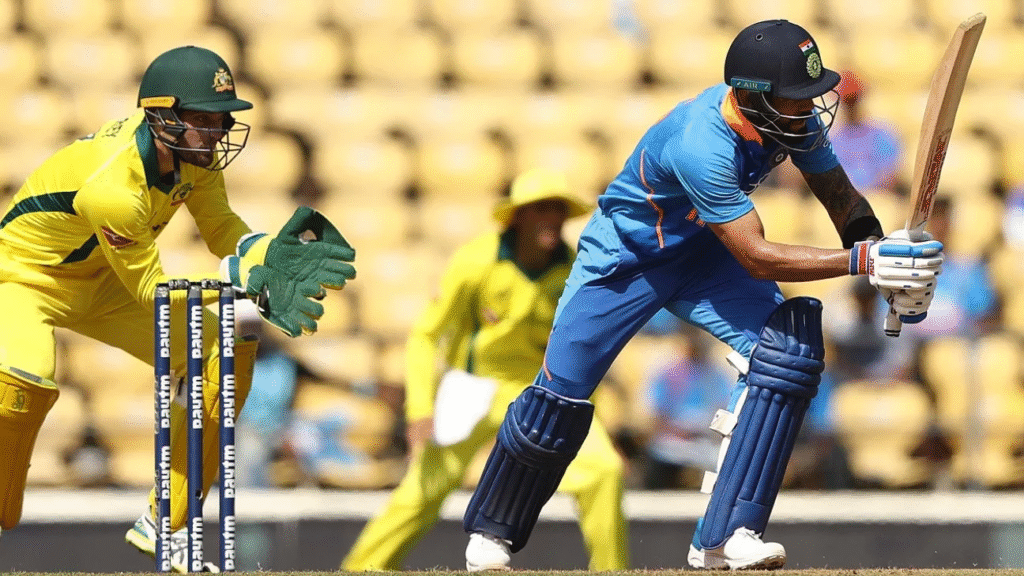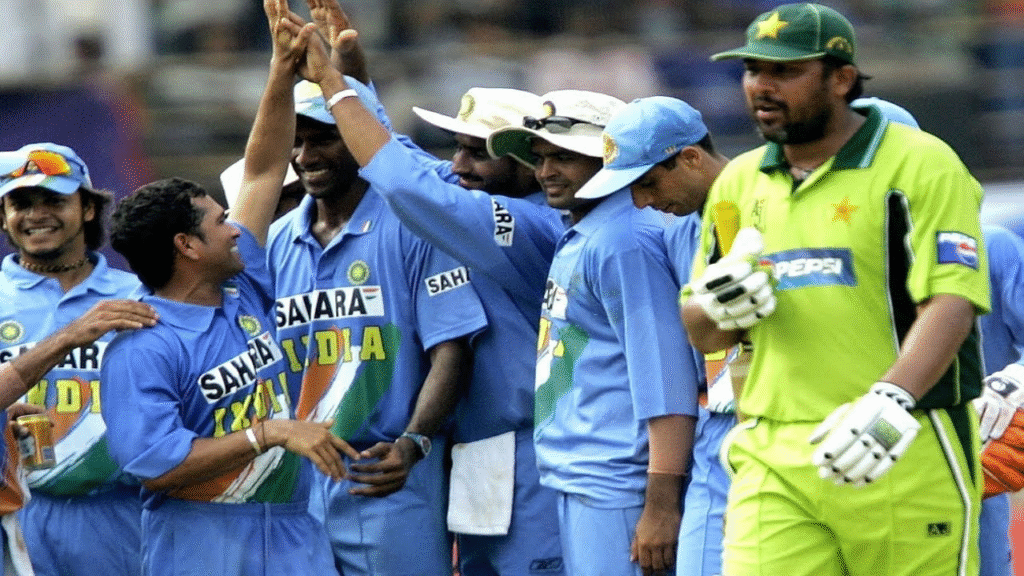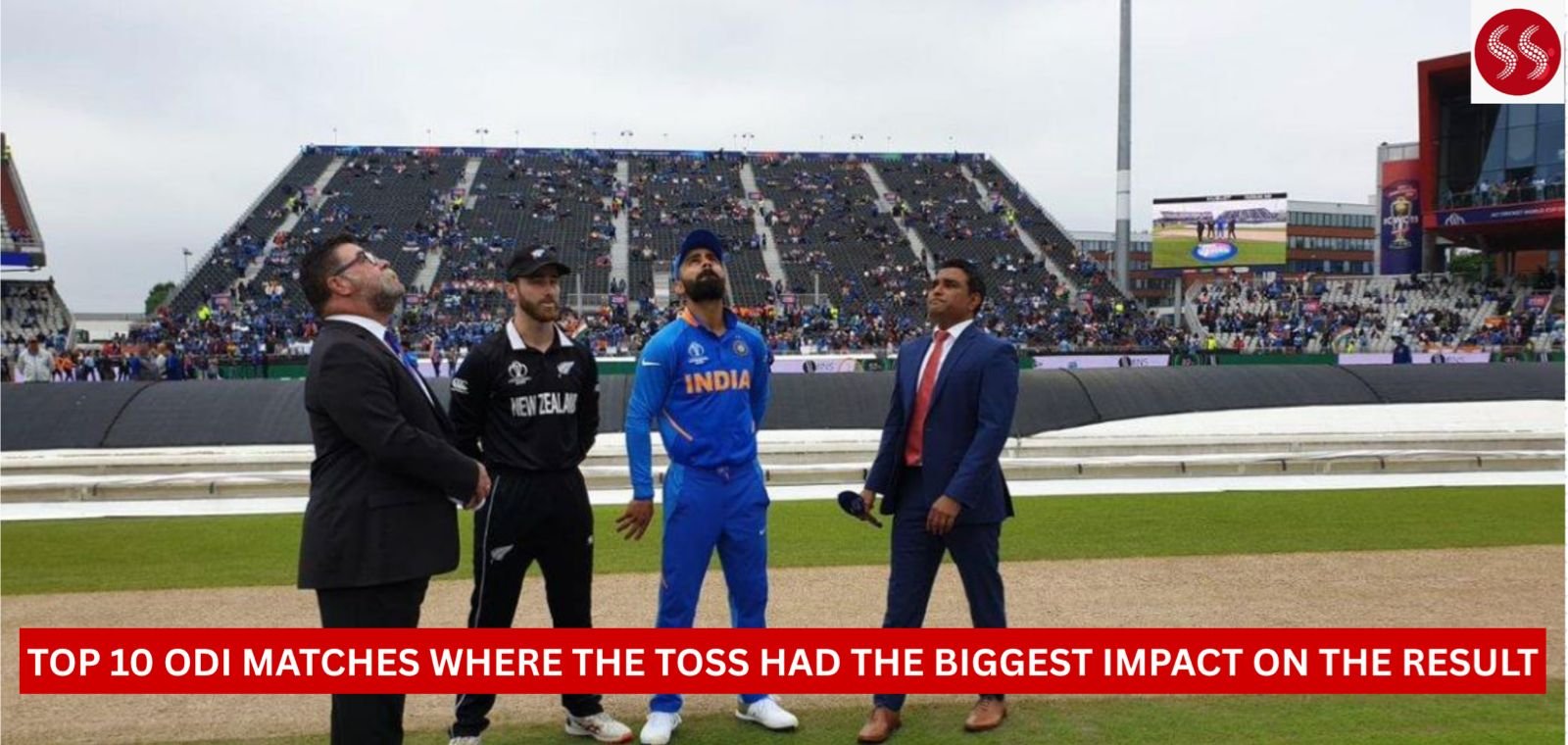In One Day Internationals (ODIs), cricket purists often say, “It’s not the toss, but how you play the 100 overs that matters.” While that’s true on most days, there are those rare and unforgettable instances when the toss had the biggest impact on the outcome of a match, when winning it meant half the game was already won. From unpredictable pitch behaviour to brutal weather conditions, the coin toss in ODIs has occasionally turned into the ultimate match-winner.
This article dives deep into 10 unforgettable ODI matches where the toss had the biggest impact, altering game strategy, momentum, and ultimately, the result. Whether it was batting first under blue skies or chasing under lights with dew aiding the batters, these matches prove just how decisive the toss can be in ODI cricket.
10. England vs India – 2011 (Bangalore)

This tie was unforgettable. England won the toss and chose to chase. Dew helped them, but not enough to cross the line. Still, many argued the toss had the biggest impact, giving them a platform to chase nearly 339.
Why the Toss Had the Biggest Impact:
- England’s chase was aided by a wet ball and short boundaries.
- Bowlers struggled to grip under the dew.
- A thrilling tie was possible due to the toss impact.
| Match | Toss Winner | Toss Decision | Result | Impact |
|---|---|---|---|---|
| ENG vs IND, 2011 WC | England | Bowl First | Match Tied | Toss helped England’s successful chase attempt |
9. Pakistan vs New Zealand – 1992 World Cup Semi-Final (Auckland)

Pakistan’s golden campaign in 1992 took off when the toss had the biggest impact. NZ batted first in conditions that became better for batting later. Inzamam-ul-Haq took full advantage, making the chase historic.
Why the Toss Had the Biggest Impact:
- Pakistan’s bowlers utilised the early morning swing.
- Chasing under lights was easier in Auckland.
- The toss flipped the momentum in Pakistan’s favour.
| Match | Toss Winner | Toss Decision | Result | Impact |
|---|---|---|---|---|
| PAK vs NZ, 1992 WC SF | Pakistan | Bowl First | Pakistan Won by 4 wickets | Toss allowed the use of the best bowling conditions |
8. Bangladesh vs India – 2012 Asia Cup (Mirpur)

Bangladesh stunned India, but the toss had the biggest impact here. India opted to bat, believing in scoreboard pressure. However, heavy dew in the second innings nullified spin, and Bangladesh chased a big total with ease.
Why the Toss Had the Biggest Impact:
- Dew made bowling nearly impossible.
- Bangladesh knew chasing under lights was easier.
- India’s decision overlooked late-night weather.
| Match | Toss Winner | Toss Decision | Result | Impact |
|---|---|---|---|---|
| BAN vs IND, 2012 | India | Bat First | BAN Won by 5 wickets | Dew favoured the chasing team significantly |
7. India vs Australia – 2019 (Nagpur)

A slow, turning track awaited in Nagpur. Australia won the toss and chose to chase, a surprising move. India posted a modest total but defended it brilliantly under lights, showing how the toss had the biggest impact on misjudging pitch behaviour.
Why the Toss Had the Biggest Impact:
- Batting first was the better option on a tiring surface.
- Spinners thrived in the second innings.
- Australia’s gamble at the toss cost them dearly.
| Match | Toss Winner | Toss Decision | Result | Impact |
|---|---|---|---|---|
| IND vs AUS, 2019 | Australia | Bowl First | India Won by 8 runs | Toss error led to chasing disadvantage |
6. England vs West Indies – 2009 (Barbados)

England chose to bat first on a damp Kensington Oval wicket. The ball zipped around in the morning, and they were bundled out for 117. West Indies chased easily, proving that the toss had the biggest impact on the game’s momentum.
Why the Toss Had the Biggest Impact:
- England didn’t account for early moisture.
- West Indies bowled under perfect seam conditions.
- The match ended in under 3 hours.
| Match | Toss Winner | Toss Decision | Result | Impact |
|---|---|---|---|---|
| ENG vs WI, 2009 | England | Bat First | WI Won by 8 wickets | The toss decision led to an early collapse |
5. Australia vs South Africa – 2006 (Johannesburg)

The greatest ODI ever played, where the toss had the biggest impact in a reverse way. Australia batted first and posted a world-record 434. However, the flatness of the pitch made bowling impossible, and South Africa chased it down.
Why the Toss Had the Biggest Impact:
- A misread by Australia’s bowling last on a road-like pitch.
- South Africa benefited from the true bounce and fast outfield.
- Tossing ironically hurt the team that won it.
| Match | Toss Winner | Toss Decision | Result | Impact |
|---|---|---|---|---|
| AUS vs SA, 2006 | Australia | Bat First | SA Won by 1 wicket | Toss led to miscalculated strategy |
4. New Zealand vs India – 2019 World Cup Semi-Final (Manchester)

An emotional semi-final where the toss had the biggest impact. New Zealand batted first on a fresh pitch. The conditions turned cloudy on Day 2 (the match was spread over 2 days), and India’s top order collapsed under swinging conditions.
Why the Toss Had the Biggest Impact:
- NZ took advantage of Day 1’s batting-friendly start.
- The overnight break brought overcast skies.
- India’s chase started in tough bowling conditions.
| Match | Toss Winner | Toss Decision | Result | Impact |
|---|---|---|---|---|
| NZ vs India, 2019 WC SF | New Zealand | Bat First | NZ Won by 18 runs | Toss gave NZ the best of batting conditions |
3. India vs Pakistan – 2005 (Kochi)

In scorching Indian summer heat, Pakistan made the cardinal error of bowling first. India piled on the runs, and the fielding team visibly wilted. This match is often cited as one where the toss had the biggest impact due to energy-sapping weather.
Why the Toss Had the Biggest Impact:
- Fielding in 40+ degree heat drained Pakistan.
- India capitalised with a 300+ score.
- Dew had minimal effect later, favouring India further.
| Match | Toss Winner | Toss Decision | Result | Impact |
|---|---|---|---|---|
| India vs Pakistan, 2005 | Pakistan | Bowl First | India Won by 87 runs | Toss backfired due to extreme weather |
2. South Africa vs England – 2000 (Bloemfontein)

A high-pressure ODI where the toss had the biggest impact. South Africa won the toss and elected to bat first on a dry Bloemfontein wicket that cracked up as the day progressed. They posted a competitive total, and under lights, England‘s batting completely collapsed.
Why the Toss Had the Biggest Impact:
- The pitch behaviour changed drastically under lights.
- England’s top order was undone by bounce and turn.
- South Africa read the conditions perfectly at the toss.
| Match | Toss Winner | Toss Decision | Result | Impact |
|---|---|---|---|---|
| South Africa vs England, 2000 | South Africa | Bat First | SA Won by 80 runs | Toss dictated control of deteriorating pitch |
1. India vs Sri Lanka – 2002 Champions Trophy Final (Colombo, Premadasa)

The 2002 ICC Champions Trophy Final was held twice due to rain, and in both matches, the toss had the biggest impact. On both occasions, Sri Lanka won the toss and chose to bat first on a sluggish Colombo pitch. While they posted decent totals, the rain came down and washed both matches out. Had India batted first, the D/L method might’ve worked in their favour.
Why the Toss Had the Biggest Impact:
- Sri Lanka’s decision to bat first ensured they controlled the tempo.
- The rain wiped out the chase both times, and India never got to bat fully.
- Ultimately, the trophy was shared, a rare outcome in major finals.
| Match | Toss Winner | Toss Decision | Result | Impact |
|---|---|---|---|---|
| India vs Sri Lanka, Final | Sri Lanka | Bat First | No Result (twice) | Toss influenced both match structures |
READ MORE:


